Exploring Forensic Accounting: Themes, Findings, and Managerial Impact
VerifiedAdded on 2023/06/07
|8
|2230
|369
Literature Review
AI Summary
This literature review delves into the background and progression of forensic accounting, highlighting its role in investigating fraud and analyzing financial information. It identifies common themes in the literature, such as the challenges in detecting financial crimes and the ambiguity surrounding forensic accounting practices. Differing findings across studies are examined, including variations in the definition of forensic accounting and the evolution of fraud detection methods. The review also discusses managerial implications, emphasizing the importance of adhering to ethical codes and standards, and addresses study limitations, suggesting directions for future research to resolve ambiguities in the field. This document is available on Desklib, where students can find a wide range of academic resources, including past papers and solved assignments.
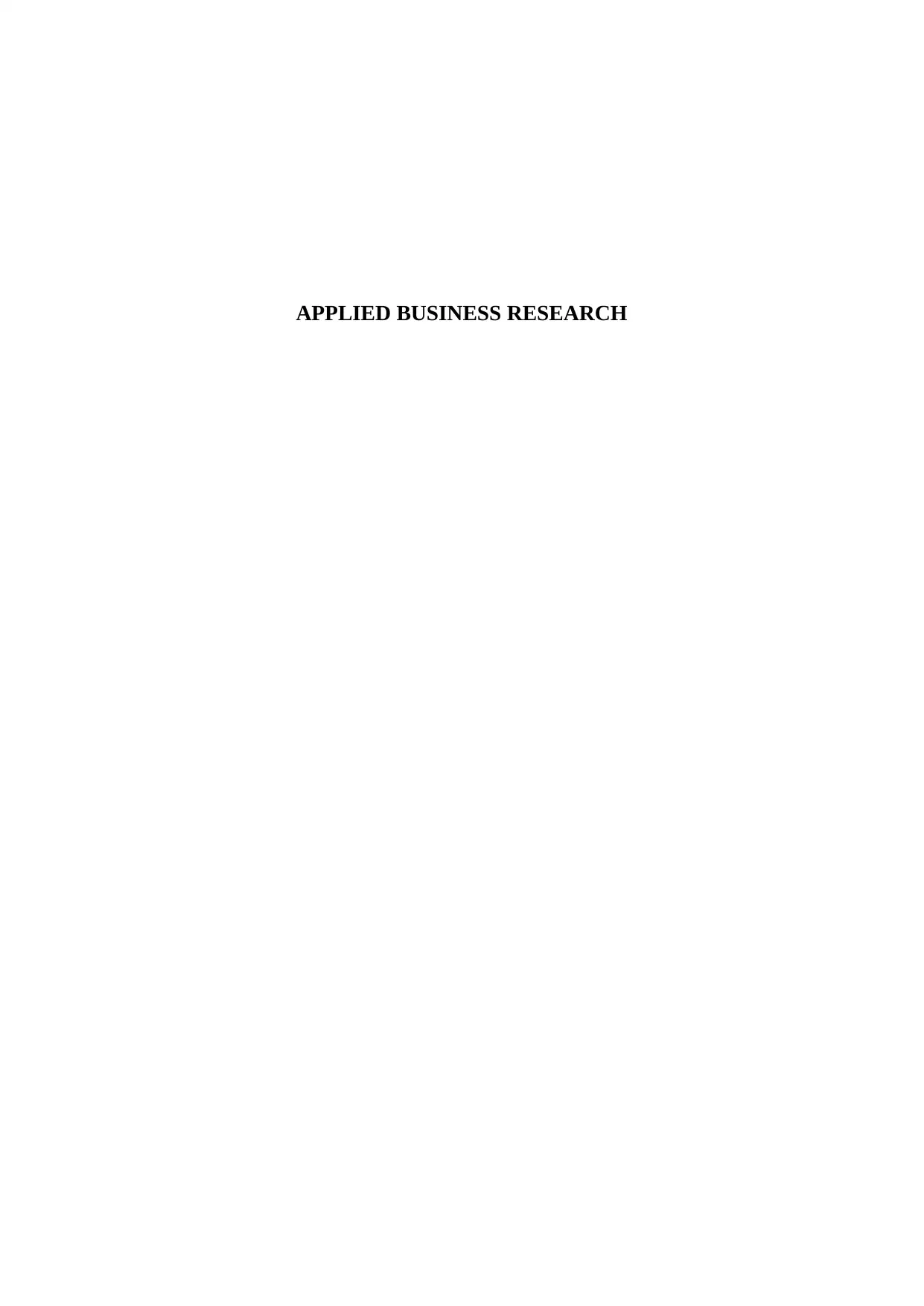
APPLIED BUSINESS RESEARCH
Paraphrase This Document
Need a fresh take? Get an instant paraphrase of this document with our AI Paraphraser
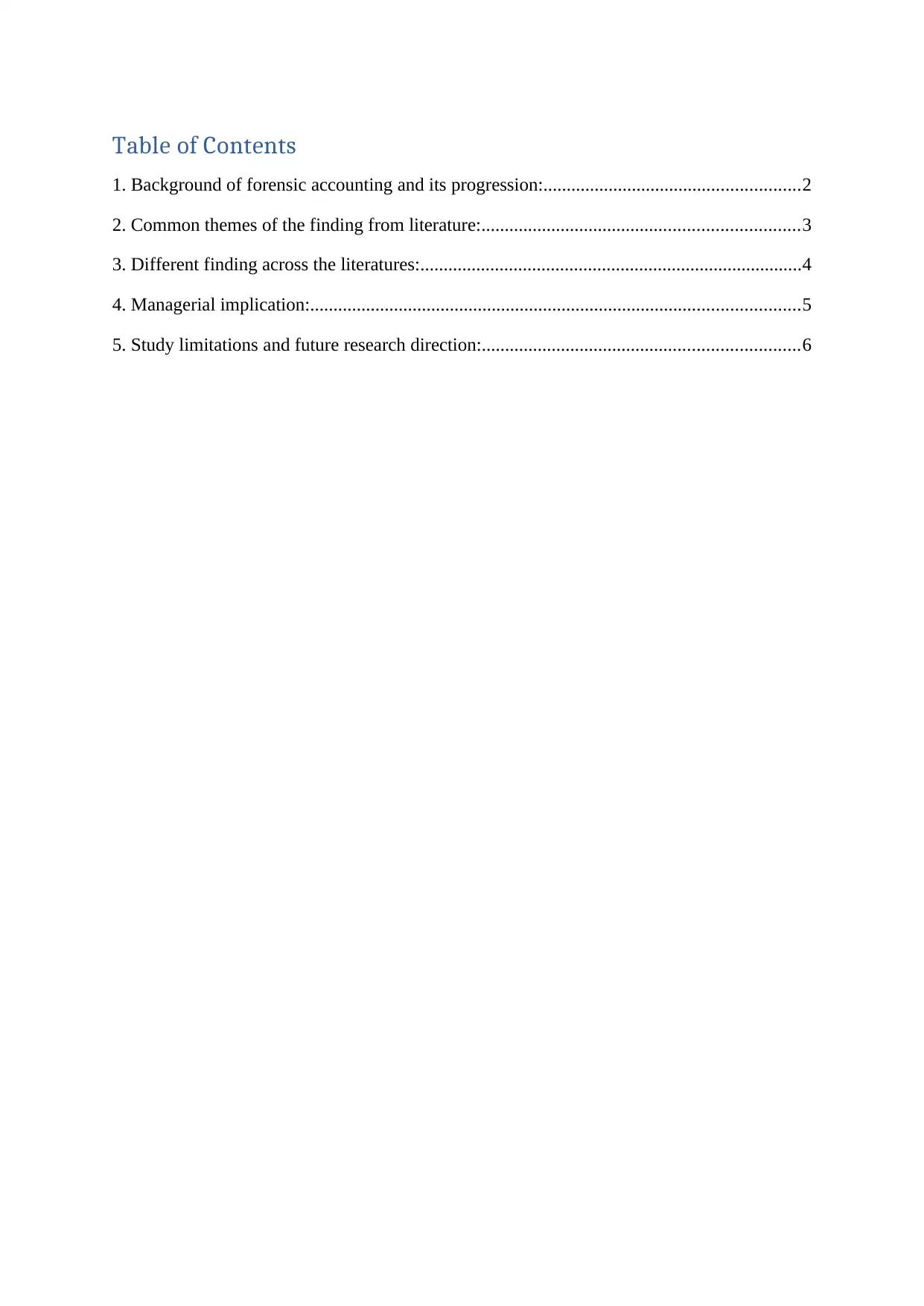
Table of Contents
1. Background of forensic accounting and its progression:.......................................................2
2. Common themes of the finding from literature:....................................................................3
3. Different finding across the literatures:..................................................................................4
4. Managerial implication:.........................................................................................................5
5. Study limitations and future research direction:....................................................................6
1. Background of forensic accounting and its progression:.......................................................2
2. Common themes of the finding from literature:....................................................................3
3. Different finding across the literatures:..................................................................................4
4. Managerial implication:.........................................................................................................5
5. Study limitations and future research direction:....................................................................6
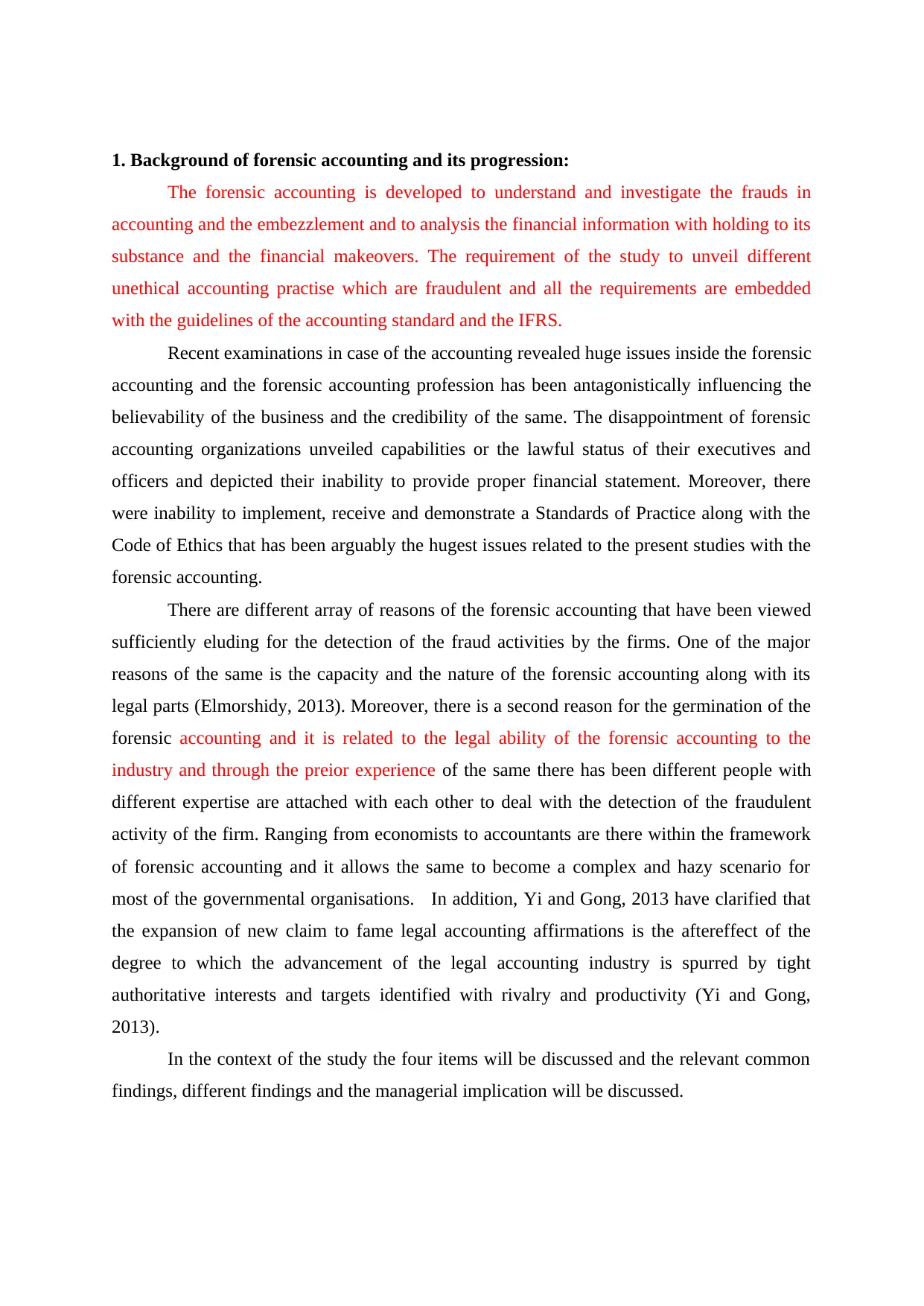
1. Background of forensic accounting and its progression:
The forensic accounting is developed to understand and investigate the frauds in
accounting and the embezzlement and to analysis the financial information with holding to its
substance and the financial makeovers. The requirement of the study to unveil different
unethical accounting practise which are fraudulent and all the requirements are embedded
with the guidelines of the accounting standard and the IFRS.
Recent examinations in case of the accounting revealed huge issues inside the forensic
accounting and the forensic accounting profession has been antagonistically influencing the
believability of the business and the credibility of the same. The disappointment of forensic
accounting organizations unveiled capabilities or the lawful status of their executives and
officers and depicted their inability to provide proper financial statement. Moreover, there
were inability to implement, receive and demonstrate a Standards of Practice along with the
Code of Ethics that has been arguably the hugest issues related to the present studies with the
forensic accounting.
There are different array of reasons of the forensic accounting that have been viewed
sufficiently eluding for the detection of the fraud activities by the firms. One of the major
reasons of the same is the capacity and the nature of the forensic accounting along with its
legal parts (Elmorshidy, 2013). Moreover, there is a second reason for the germination of the
forensic accounting and it is related to the legal ability of the forensic accounting to the
industry and through the preior experience of the same there has been different people with
different expertise are attached with each other to deal with the detection of the fraudulent
activity of the firm. Ranging from economists to accountants are there within the framework
of forensic accounting and it allows the same to become a complex and hazy scenario for
most of the governmental organisations. In addition, Yi and Gong, 2013 have clarified that
the expansion of new claim to fame legal accounting affirmations is the aftereffect of the
degree to which the advancement of the legal accounting industry is spurred by tight
authoritative interests and targets identified with rivalry and productivity (Yi and Gong,
2013).
In the context of the study the four items will be discussed and the relevant common
findings, different findings and the managerial implication will be discussed.
The forensic accounting is developed to understand and investigate the frauds in
accounting and the embezzlement and to analysis the financial information with holding to its
substance and the financial makeovers. The requirement of the study to unveil different
unethical accounting practise which are fraudulent and all the requirements are embedded
with the guidelines of the accounting standard and the IFRS.
Recent examinations in case of the accounting revealed huge issues inside the forensic
accounting and the forensic accounting profession has been antagonistically influencing the
believability of the business and the credibility of the same. The disappointment of forensic
accounting organizations unveiled capabilities or the lawful status of their executives and
officers and depicted their inability to provide proper financial statement. Moreover, there
were inability to implement, receive and demonstrate a Standards of Practice along with the
Code of Ethics that has been arguably the hugest issues related to the present studies with the
forensic accounting.
There are different array of reasons of the forensic accounting that have been viewed
sufficiently eluding for the detection of the fraud activities by the firms. One of the major
reasons of the same is the capacity and the nature of the forensic accounting along with its
legal parts (Elmorshidy, 2013). Moreover, there is a second reason for the germination of the
forensic accounting and it is related to the legal ability of the forensic accounting to the
industry and through the preior experience of the same there has been different people with
different expertise are attached with each other to deal with the detection of the fraudulent
activity of the firm. Ranging from economists to accountants are there within the framework
of forensic accounting and it allows the same to become a complex and hazy scenario for
most of the governmental organisations. In addition, Yi and Gong, 2013 have clarified that
the expansion of new claim to fame legal accounting affirmations is the aftereffect of the
degree to which the advancement of the legal accounting industry is spurred by tight
authoritative interests and targets identified with rivalry and productivity (Yi and Gong,
2013).
In the context of the study the four items will be discussed and the relevant common
findings, different findings and the managerial implication will be discussed.
⊘ This is a preview!⊘
Do you want full access?
Subscribe today to unlock all pages.

Trusted by 1+ million students worldwide
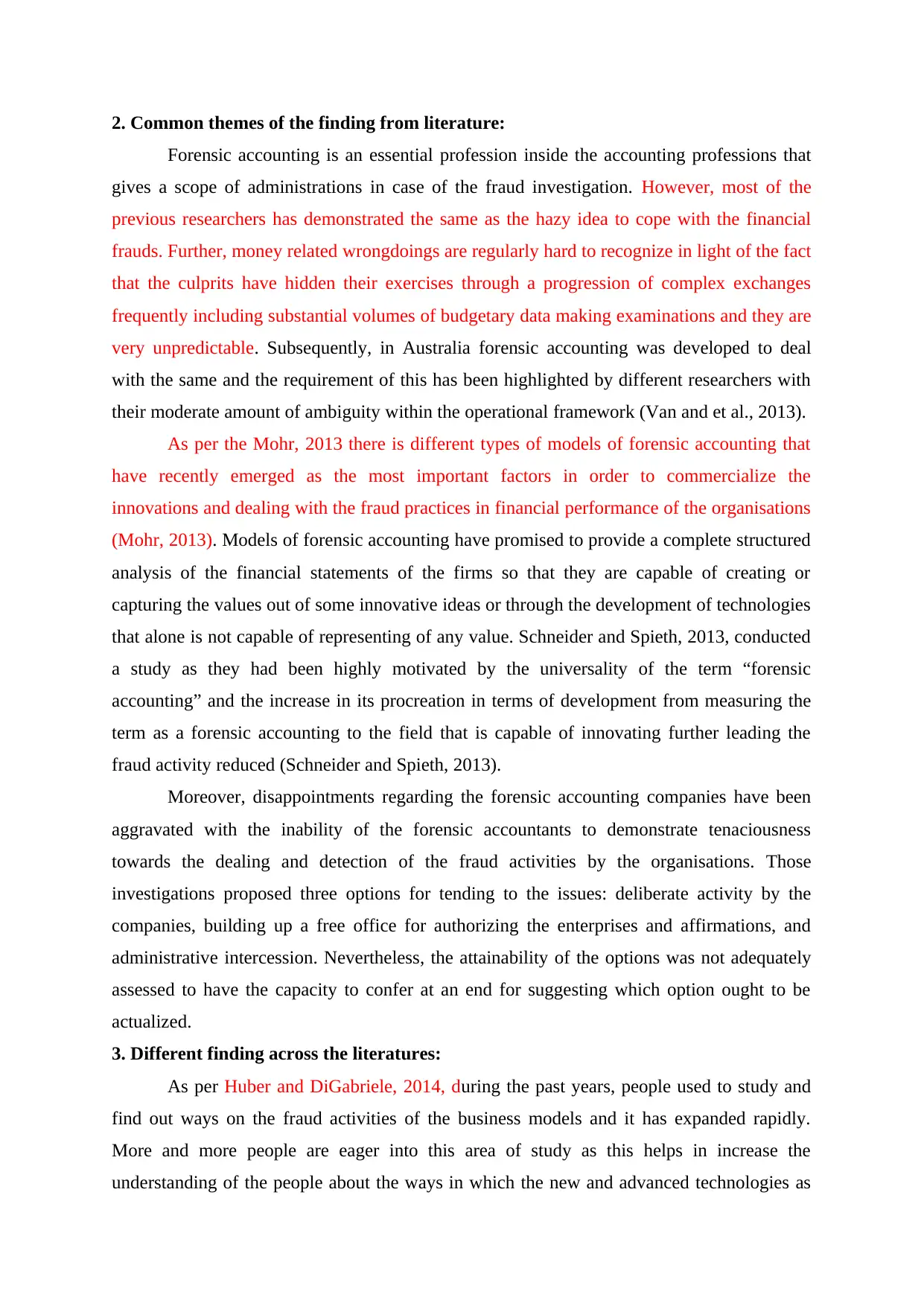
2. Common themes of the finding from literature:
Forensic accounting is an essential profession inside the accounting professions that
gives a scope of administrations in case of the fraud investigation. However, most of the
previous researchers has demonstrated the same as the hazy idea to cope with the financial
frauds. Further, money related wrongdoings are regularly hard to recognize in light of the fact
that the culprits have hidden their exercises through a progression of complex exchanges
frequently including substantial volumes of budgetary data making examinations and they are
very unpredictable. Subsequently, in Australia forensic accounting was developed to deal
with the same and the requirement of this has been highlighted by different researchers with
their moderate amount of ambiguity within the operational framework (Van and et al., 2013).
As per the Mohr, 2013 there is different types of models of forensic accounting that
have recently emerged as the most important factors in order to commercialize the
innovations and dealing with the fraud practices in financial performance of the organisations
(Mohr, 2013). Models of forensic accounting have promised to provide a complete structured
analysis of the financial statements of the firms so that they are capable of creating or
capturing the values out of some innovative ideas or through the development of technologies
that alone is not capable of representing of any value. Schneider and Spieth, 2013, conducted
a study as they had been highly motivated by the universality of the term “forensic
accounting” and the increase in its procreation in terms of development from measuring the
term as a forensic accounting to the field that is capable of innovating further leading the
fraud activity reduced (Schneider and Spieth, 2013).
Moreover, disappointments regarding the forensic accounting companies have been
aggravated with the inability of the forensic accountants to demonstrate tenaciousness
towards the dealing and detection of the fraud activities by the organisations. Those
investigations proposed three options for tending to the issues: deliberate activity by the
companies, building up a free office for authorizing the enterprises and affirmations, and
administrative intercession. Nevertheless, the attainability of the options was not adequately
assessed to have the capacity to confer at an end for suggesting which option ought to be
actualized.
3. Different finding across the literatures:
As per Huber and DiGabriele, 2014, during the past years, people used to study and
find out ways on the fraud activities of the business models and it has expanded rapidly.
More and more people are eager into this area of study as this helps in increase the
understanding of the people about the ways in which the new and advanced technologies as
Forensic accounting is an essential profession inside the accounting professions that
gives a scope of administrations in case of the fraud investigation. However, most of the
previous researchers has demonstrated the same as the hazy idea to cope with the financial
frauds. Further, money related wrongdoings are regularly hard to recognize in light of the fact
that the culprits have hidden their exercises through a progression of complex exchanges
frequently including substantial volumes of budgetary data making examinations and they are
very unpredictable. Subsequently, in Australia forensic accounting was developed to deal
with the same and the requirement of this has been highlighted by different researchers with
their moderate amount of ambiguity within the operational framework (Van and et al., 2013).
As per the Mohr, 2013 there is different types of models of forensic accounting that
have recently emerged as the most important factors in order to commercialize the
innovations and dealing with the fraud practices in financial performance of the organisations
(Mohr, 2013). Models of forensic accounting have promised to provide a complete structured
analysis of the financial statements of the firms so that they are capable of creating or
capturing the values out of some innovative ideas or through the development of technologies
that alone is not capable of representing of any value. Schneider and Spieth, 2013, conducted
a study as they had been highly motivated by the universality of the term “forensic
accounting” and the increase in its procreation in terms of development from measuring the
term as a forensic accounting to the field that is capable of innovating further leading the
fraud activity reduced (Schneider and Spieth, 2013).
Moreover, disappointments regarding the forensic accounting companies have been
aggravated with the inability of the forensic accountants to demonstrate tenaciousness
towards the dealing and detection of the fraud activities by the organisations. Those
investigations proposed three options for tending to the issues: deliberate activity by the
companies, building up a free office for authorizing the enterprises and affirmations, and
administrative intercession. Nevertheless, the attainability of the options was not adequately
assessed to have the capacity to confer at an end for suggesting which option ought to be
actualized.
3. Different finding across the literatures:
As per Huber and DiGabriele, 2014, during the past years, people used to study and
find out ways on the fraud activities of the business models and it has expanded rapidly.
More and more people are eager into this area of study as this helps in increase the
understanding of the people about the ways in which the new and advanced technologies as
Paraphrase This Document
Need a fresh take? Get an instant paraphrase of this document with our AI Paraphraser
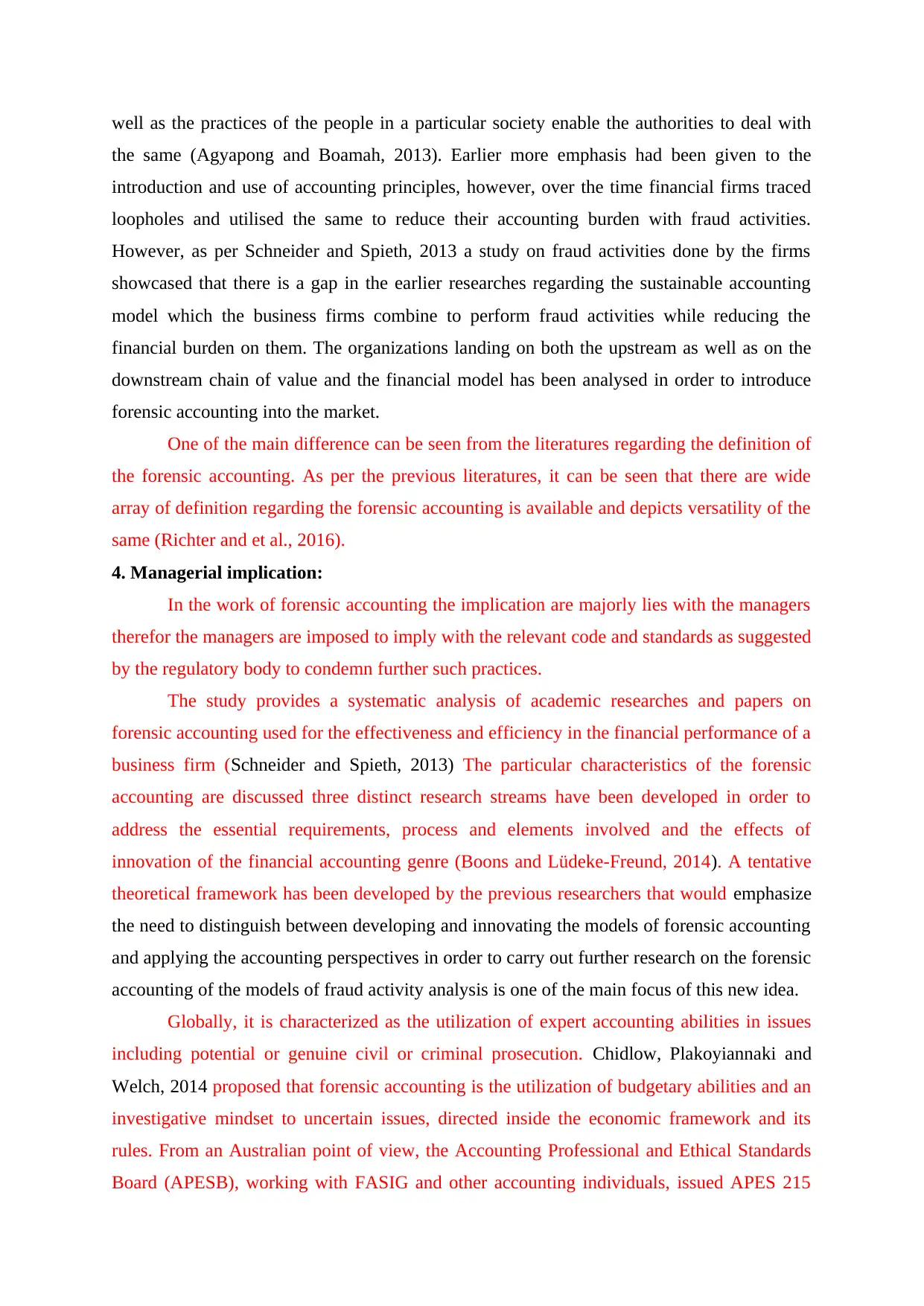
well as the practices of the people in a particular society enable the authorities to deal with
the same (Agyapong and Boamah, 2013). Earlier more emphasis had been given to the
introduction and use of accounting principles, however, over the time financial firms traced
loopholes and utilised the same to reduce their accounting burden with fraud activities.
However, as per Schneider and Spieth, 2013 a study on fraud activities done by the firms
showcased that there is a gap in the earlier researches regarding the sustainable accounting
model which the business firms combine to perform fraud activities while reducing the
financial burden on them. The organizations landing on both the upstream as well as on the
downstream chain of value and the financial model has been analysed in order to introduce
forensic accounting into the market.
One of the main difference can be seen from the literatures regarding the definition of
the forensic accounting. As per the previous literatures, it can be seen that there are wide
array of definition regarding the forensic accounting is available and depicts versatility of the
same (Richter and et al., 2016).
4. Managerial implication:
In the work of forensic accounting the implication are majorly lies with the managers
therefor the managers are imposed to imply with the relevant code and standards as suggested
by the regulatory body to condemn further such practices.
The study provides a systematic analysis of academic researches and papers on
forensic accounting used for the effectiveness and efficiency in the financial performance of a
business firm (Schneider and Spieth, 2013) The particular characteristics of the forensic
accounting are discussed three distinct research streams have been developed in order to
address the essential requirements, process and elements involved and the effects of
innovation of the financial accounting genre (Boons and Lüdeke-Freund, 2014). A tentative
theoretical framework has been developed by the previous researchers that would emphasize
the need to distinguish between developing and innovating the models of forensic accounting
and applying the accounting perspectives in order to carry out further research on the forensic
accounting of the models of fraud activity analysis is one of the main focus of this new idea.
Globally, it is characterized as the utilization of expert accounting abilities in issues
including potential or genuine civil or criminal prosecution. Chidlow, Plakoyiannaki and
Welch, 2014 proposed that forensic accounting is the utilization of budgetary abilities and an
investigative mindset to uncertain issues, directed inside the economic framework and its
rules. From an Australian point of view, the Accounting Professional and Ethical Standards
Board (APESB), working with FASIG and other accounting individuals, issued APES 215
the same (Agyapong and Boamah, 2013). Earlier more emphasis had been given to the
introduction and use of accounting principles, however, over the time financial firms traced
loopholes and utilised the same to reduce their accounting burden with fraud activities.
However, as per Schneider and Spieth, 2013 a study on fraud activities done by the firms
showcased that there is a gap in the earlier researches regarding the sustainable accounting
model which the business firms combine to perform fraud activities while reducing the
financial burden on them. The organizations landing on both the upstream as well as on the
downstream chain of value and the financial model has been analysed in order to introduce
forensic accounting into the market.
One of the main difference can be seen from the literatures regarding the definition of
the forensic accounting. As per the previous literatures, it can be seen that there are wide
array of definition regarding the forensic accounting is available and depicts versatility of the
same (Richter and et al., 2016).
4. Managerial implication:
In the work of forensic accounting the implication are majorly lies with the managers
therefor the managers are imposed to imply with the relevant code and standards as suggested
by the regulatory body to condemn further such practices.
The study provides a systematic analysis of academic researches and papers on
forensic accounting used for the effectiveness and efficiency in the financial performance of a
business firm (Schneider and Spieth, 2013) The particular characteristics of the forensic
accounting are discussed three distinct research streams have been developed in order to
address the essential requirements, process and elements involved and the effects of
innovation of the financial accounting genre (Boons and Lüdeke-Freund, 2014). A tentative
theoretical framework has been developed by the previous researchers that would emphasize
the need to distinguish between developing and innovating the models of forensic accounting
and applying the accounting perspectives in order to carry out further research on the forensic
accounting of the models of fraud activity analysis is one of the main focus of this new idea.
Globally, it is characterized as the utilization of expert accounting abilities in issues
including potential or genuine civil or criminal prosecution. Chidlow, Plakoyiannaki and
Welch, 2014 proposed that forensic accounting is the utilization of budgetary abilities and an
investigative mindset to uncertain issues, directed inside the economic framework and its
rules. From an Australian point of view, the Accounting Professional and Ethical Standards
Board (APESB), working with FASIG and other accounting individuals, issued APES 215
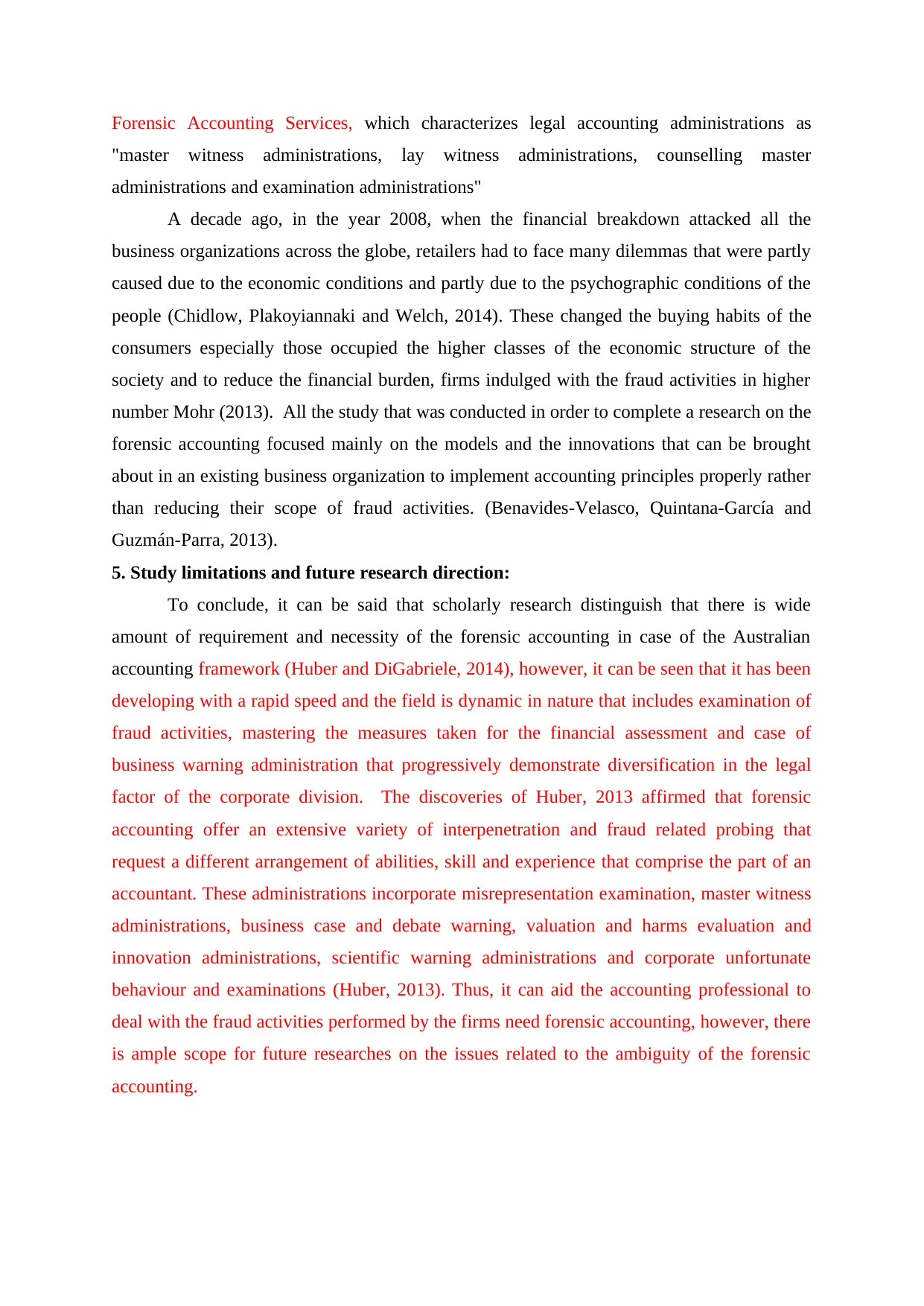
Forensic Accounting Services, which characterizes legal accounting administrations as
"master witness administrations, lay witness administrations, counselling master
administrations and examination administrations"
A decade ago, in the year 2008, when the financial breakdown attacked all the
business organizations across the globe, retailers had to face many dilemmas that were partly
caused due to the economic conditions and partly due to the psychographic conditions of the
people (Chidlow, Plakoyiannaki and Welch, 2014). These changed the buying habits of the
consumers especially those occupied the higher classes of the economic structure of the
society and to reduce the financial burden, firms indulged with the fraud activities in higher
number Mohr (2013). All the study that was conducted in order to complete a research on the
forensic accounting focused mainly on the models and the innovations that can be brought
about in an existing business organization to implement accounting principles properly rather
than reducing their scope of fraud activities. (Benavides-Velasco, Quintana-García and
Guzmán-Parra, 2013).
5. Study limitations and future research direction:
To conclude, it can be said that scholarly research distinguish that there is wide
amount of requirement and necessity of the forensic accounting in case of the Australian
accounting framework (Huber and DiGabriele, 2014), however, it can be seen that it has been
developing with a rapid speed and the field is dynamic in nature that includes examination of
fraud activities, mastering the measures taken for the financial assessment and case of
business warning administration that progressively demonstrate diversification in the legal
factor of the corporate division. The discoveries of Huber, 2013 affirmed that forensic
accounting offer an extensive variety of interpenetration and fraud related probing that
request a different arrangement of abilities, skill and experience that comprise the part of an
accountant. These administrations incorporate misrepresentation examination, master witness
administrations, business case and debate warning, valuation and harms evaluation and
innovation administrations, scientific warning administrations and corporate unfortunate
behaviour and examinations (Huber, 2013). Thus, it can aid the accounting professional to
deal with the fraud activities performed by the firms need forensic accounting, however, there
is ample scope for future researches on the issues related to the ambiguity of the forensic
accounting.
"master witness administrations, lay witness administrations, counselling master
administrations and examination administrations"
A decade ago, in the year 2008, when the financial breakdown attacked all the
business organizations across the globe, retailers had to face many dilemmas that were partly
caused due to the economic conditions and partly due to the psychographic conditions of the
people (Chidlow, Plakoyiannaki and Welch, 2014). These changed the buying habits of the
consumers especially those occupied the higher classes of the economic structure of the
society and to reduce the financial burden, firms indulged with the fraud activities in higher
number Mohr (2013). All the study that was conducted in order to complete a research on the
forensic accounting focused mainly on the models and the innovations that can be brought
about in an existing business organization to implement accounting principles properly rather
than reducing their scope of fraud activities. (Benavides-Velasco, Quintana-García and
Guzmán-Parra, 2013).
5. Study limitations and future research direction:
To conclude, it can be said that scholarly research distinguish that there is wide
amount of requirement and necessity of the forensic accounting in case of the Australian
accounting framework (Huber and DiGabriele, 2014), however, it can be seen that it has been
developing with a rapid speed and the field is dynamic in nature that includes examination of
fraud activities, mastering the measures taken for the financial assessment and case of
business warning administration that progressively demonstrate diversification in the legal
factor of the corporate division. The discoveries of Huber, 2013 affirmed that forensic
accounting offer an extensive variety of interpenetration and fraud related probing that
request a different arrangement of abilities, skill and experience that comprise the part of an
accountant. These administrations incorporate misrepresentation examination, master witness
administrations, business case and debate warning, valuation and harms evaluation and
innovation administrations, scientific warning administrations and corporate unfortunate
behaviour and examinations (Huber, 2013). Thus, it can aid the accounting professional to
deal with the fraud activities performed by the firms need forensic accounting, however, there
is ample scope for future researches on the issues related to the ambiguity of the forensic
accounting.
⊘ This is a preview!⊘
Do you want full access?
Subscribe today to unlock all pages.

Trusted by 1+ million students worldwide
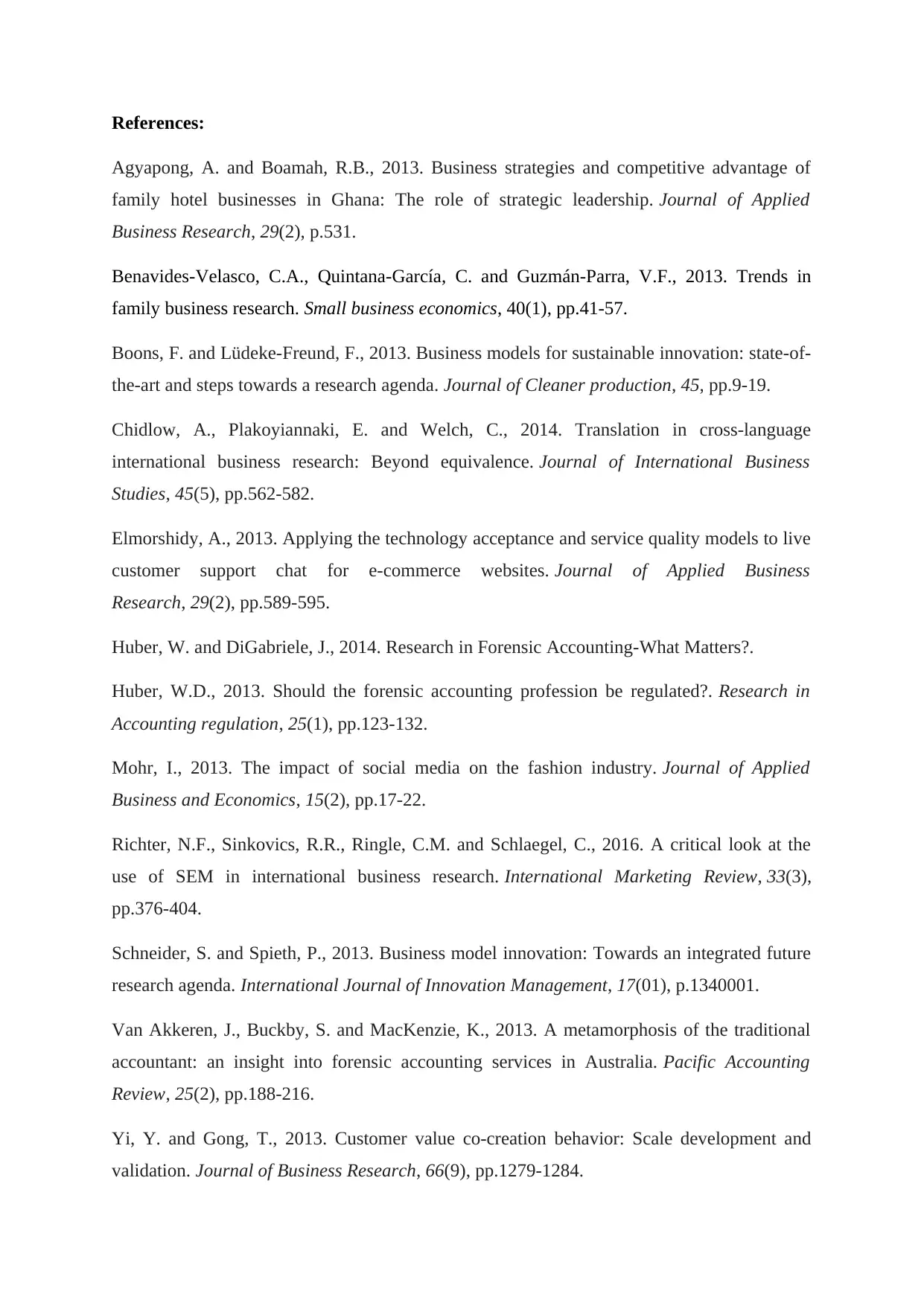
References:
Agyapong, A. and Boamah, R.B., 2013. Business strategies and competitive advantage of
family hotel businesses in Ghana: The role of strategic leadership. Journal of Applied
Business Research, 29(2), p.531.
Benavides-Velasco, C.A., Quintana-García, C. and Guzmán-Parra, V.F., 2013. Trends in
family business research. Small business economics, 40(1), pp.41-57.
Boons, F. and Lüdeke-Freund, F., 2013. Business models for sustainable innovation: state-of-
the-art and steps towards a research agenda. Journal of Cleaner production, 45, pp.9-19.
Chidlow, A., Plakoyiannaki, E. and Welch, C., 2014. Translation in cross-language
international business research: Beyond equivalence. Journal of International Business
Studies, 45(5), pp.562-582.
Elmorshidy, A., 2013. Applying the technology acceptance and service quality models to live
customer support chat for e-commerce websites. Journal of Applied Business
Research, 29(2), pp.589-595.
Huber, W. and DiGabriele, J., 2014. Research in Forensic Accounting-What Matters?.
Huber, W.D., 2013. Should the forensic accounting profession be regulated?. Research in
Accounting regulation, 25(1), pp.123-132.
Mohr, I., 2013. The impact of social media on the fashion industry. Journal of Applied
Business and Economics, 15(2), pp.17-22.
Richter, N.F., Sinkovics, R.R., Ringle, C.M. and Schlaegel, C., 2016. A critical look at the
use of SEM in international business research. International Marketing Review, 33(3),
pp.376-404.
Schneider, S. and Spieth, P., 2013. Business model innovation: Towards an integrated future
research agenda. International Journal of Innovation Management, 17(01), p.1340001.
Van Akkeren, J., Buckby, S. and MacKenzie, K., 2013. A metamorphosis of the traditional
accountant: an insight into forensic accounting services in Australia. Pacific Accounting
Review, 25(2), pp.188-216.
Yi, Y. and Gong, T., 2013. Customer value co-creation behavior: Scale development and
validation. Journal of Business Research, 66(9), pp.1279-1284.
Agyapong, A. and Boamah, R.B., 2013. Business strategies and competitive advantage of
family hotel businesses in Ghana: The role of strategic leadership. Journal of Applied
Business Research, 29(2), p.531.
Benavides-Velasco, C.A., Quintana-García, C. and Guzmán-Parra, V.F., 2013. Trends in
family business research. Small business economics, 40(1), pp.41-57.
Boons, F. and Lüdeke-Freund, F., 2013. Business models for sustainable innovation: state-of-
the-art and steps towards a research agenda. Journal of Cleaner production, 45, pp.9-19.
Chidlow, A., Plakoyiannaki, E. and Welch, C., 2014. Translation in cross-language
international business research: Beyond equivalence. Journal of International Business
Studies, 45(5), pp.562-582.
Elmorshidy, A., 2013. Applying the technology acceptance and service quality models to live
customer support chat for e-commerce websites. Journal of Applied Business
Research, 29(2), pp.589-595.
Huber, W. and DiGabriele, J., 2014. Research in Forensic Accounting-What Matters?.
Huber, W.D., 2013. Should the forensic accounting profession be regulated?. Research in
Accounting regulation, 25(1), pp.123-132.
Mohr, I., 2013. The impact of social media on the fashion industry. Journal of Applied
Business and Economics, 15(2), pp.17-22.
Richter, N.F., Sinkovics, R.R., Ringle, C.M. and Schlaegel, C., 2016. A critical look at the
use of SEM in international business research. International Marketing Review, 33(3),
pp.376-404.
Schneider, S. and Spieth, P., 2013. Business model innovation: Towards an integrated future
research agenda. International Journal of Innovation Management, 17(01), p.1340001.
Van Akkeren, J., Buckby, S. and MacKenzie, K., 2013. A metamorphosis of the traditional
accountant: an insight into forensic accounting services in Australia. Pacific Accounting
Review, 25(2), pp.188-216.
Yi, Y. and Gong, T., 2013. Customer value co-creation behavior: Scale development and
validation. Journal of Business Research, 66(9), pp.1279-1284.
Paraphrase This Document
Need a fresh take? Get an instant paraphrase of this document with our AI Paraphraser

1 out of 8
Related Documents
Your All-in-One AI-Powered Toolkit for Academic Success.
+13062052269
info@desklib.com
Available 24*7 on WhatsApp / Email
![[object Object]](/_next/static/media/star-bottom.7253800d.svg)
Unlock your academic potential
Copyright © 2020–2026 A2Z Services. All Rights Reserved. Developed and managed by ZUCOL.


